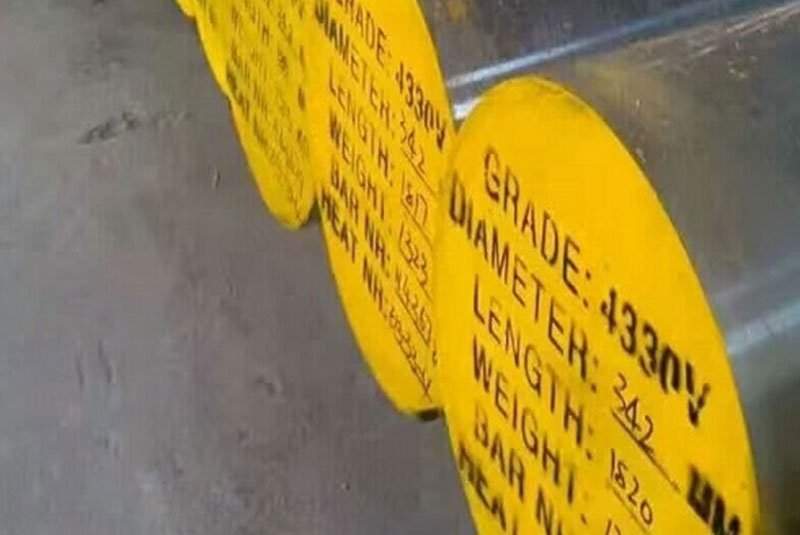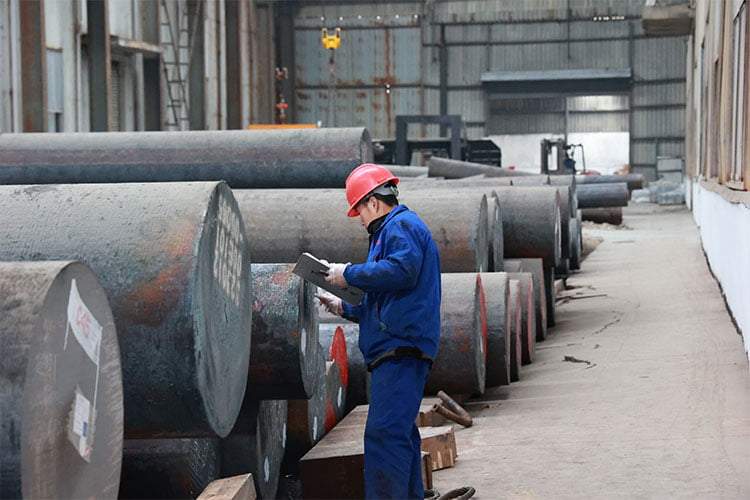Introduction
4340 alloy steel is a high-strength, low-alloy steel that is known for its exceptional toughness, high fatigue strength, and excellent hardenability. It is widely used in various industries due to its versatile properties and ability to perform under extreme conditions. This comprehensive guide explores the top uses of 4340 alloy steel in manufacturing, detailing its properties, applications, and advantages.
Understanding 4340 Alloy Steel

What is 4340 Alloy Steel?
4340 alloy steel, classified as a nickel-chromium-molybdenum steel, is renowned for its exceptional properties, particularly its high tensile strength and remarkable toughness. This robust composition makes 4340 alloy steel an ideal material for use in environments where components are subjected to significant stress and require substantial shock resistance. Industries such as aerospace, automotive, and heavy machinery rely on this steel’s ability to withstand extreme conditions, including high-impact forces and continuous, rigorous use. Its composition includes:
- Nickel: Enhances toughness.
- Chromium: Increases hardness and wear resistance.
- Molybdenum: Improves strength and hardenability.
Key Properties of 4340 Alloy Steel
4340 alloy steel stands out due to its impressive mechanical properties, making it suitable for demanding applications. Some of its key properties include:
- High Strength: Provides durability and resistance to deformation.
- Excellent Toughness: Withstands heavy loads and impacts.
- Good Fatigue Strength: Performs well under repeated stress.
- Hardenability: Can be heat treated to achieve desired hardness levels.
Table: Chemical Composition of 4340 Alloy Steel
| Element | Percentage (%) |
|---|---|
| Carbon | 0.38-0.43 |
| Nickel | 1.65-2.00 |
| Chromium | 0.70-0.90 |
| Molybdenum | 0.20-0.30 |
| Silicon | 0.15-0.30 |
| Manganese | 0.60-0.80 |
| Sulfur | 0.04 max |
| Phosphorus | 0.035 max |
Top Uses of 4340 Alloy Steel in Manufacturing
Aerospace Industry
Aircraft Landing Gear
One of the primary applications of 4340 alloy steel is in the aerospace industry, where it is extensively used for manufacturing aircraft landing gear. This demanding application requires materials that can endure extreme stresses, particularly during the critical phases of takeoff and landing. 4340 alloy steel, with its superior high strength and exceptional toughness, is perfectly suited for this purpose.This combination of characteristics makes 4340 alloy steel an indispensable material in the aerospace sector, providing the necessary durability and performance required for critical landing gear assemblies.
- High Stress Resistance: Essential for landing gear components.
- Durability: Prolongs the life of critical aerospace parts.
Engine Components
4340 alloy steel is widely utilized in various engine components, such as crankshafts, connecting rods, and camshafts, because of its exceptional ability to maintain strength and integrity under high temperatures and stresses. This steel’s robust composition, including elements like nickel, chromium, and molybdenum, allows it to withstand the extreme conditions often encountered within an engine. Whether enduring the constant friction and heat of internal combustion or handling the significant forces generated during operation, 4340 alloy steel ensures that these critical components perform reliably and efficiently.
- Heat Resistance: Suitable for high-temperature engine parts.
- Fatigue Strength: Ensures reliability under continuous use.
Automotive Industry
Crankshafts and Connecting Rods
In the automotive industry, 4340 alloy steel plays a crucial role in the manufacturing of essential engine components such as crankshafts and connecting rods. These components are subjected to extreme conditions and must endure the rigorous demands of internal combustion engines, including high rotational speeds, significant stress, and continuous thermal cycling. The high fatigue strength of 4340 alloy steel ensures that crankshafts and connecting rods can withstand these repeated stress cycles without failing, which is vital for the engine’s reliability and longevity.
- Fatigue Resistance: Ideal for high-stress engine components.
- Durability: Enhances the longevity of automotive parts.
Transmission Components
Transmission components, such as gears and shafts, are often made from 4340 alloy steel due to its excellent hardenability and wear resistance.
- Wear Resistance: Essential for transmission gears and shafts.
- Strength: Provides reliability and performance.
Oil and Gas Industry
Drill Bits and Tool Joints
The oil and gas industry utilizes 4340 alloy steel for drill bits and tool joints. The material’s toughness and wear resistance are crucial for drilling operations in harsh environments.
- Wear Resistance: Ensures longevity in abrasive conditions.
- Toughness: Withstands high-impact drilling operations.
Pipeline Components
4340 alloy steel is also used in the construction of pipeline components that require high strength and corrosion resistance.
- Corrosion Resistance: Suitable for harsh environments.
- High Strength: Ensures structural integrity of pipelines.
Heavy Machinery
Construction Equipment
Heavy machinery and construction equipment, such as bulldozers and excavators, benefit from the use of 4340 alloy steel. Its strength and toughness make it ideal for components subjected to heavy loads and impacts.
- Load Bearing Capacity: Supports heavy-duty construction tasks.
- Impact Resistance: Reduces the risk of equipment failure.
Mining Equipment
Mining equipment, including drills and crushers, often incorporate 4340 alloy steel due to its durability and resistance to wear and tear.
- Durability: Prolongs the life of mining tools.
- Wear Resistance: Essential for high-abrasion applications.
Military Applications
Armored Vehicles
In the military sector, 4340 alloy steel is used for manufacturing armored vehicles. The material’s high strength and toughness provide the necessary protection against ballistic threats.
- Ballistic Protection: Enhances vehicle safety.
- Structural Integrity: Maintains performance under extreme conditions.
Weapons Systems
Weapons systems, such as artillery and firearms, also utilize 4340 alloy steel for its durability and ability to withstand high stresses.
- High Strength: Essential for reliable weapon performance.
- Durability: Ensures longevity of military equipment.
Advantages of 4340 Alloy Steel

High Strength and Toughness
4340 alloy steel offers a combination of high strength and toughness, making it suitable for applications that require durability and resistance to deformation.
- Strength: Withstands heavy loads and stresses.
- Toughness: Resists impacts and shocks.
Versatility in Applications
The versatility of 4340 alloy steel allows it to be used across various industries, from aerospace and automotive to oil and gas, heavy machinery, and military applications.
- Wide Range of Uses: Suitable for multiple industries.
- Adaptability: Meets specific requirements of different applications.
Excellent Hardenability
4340 alloy steel can be heat treated to achieve the desired hardness levels, enhancing its wear resistance and extending its service life.
- Hardenability: Customizable hardness through heat treatment.
- Wear Resistance: Prolongs the life of components.
Conclusion
4340 alloy steel is a highly versatile and reliable material used in numerous manufacturing applications. Its unique combination of high strength, toughness, and excellent hardenability makes it ideal for demanding environments across various industries. Whether in aerospace, automotive, oil and gas, heavy machinery, or military applications, 4340 alloy steel continues to prove its value as an essential material in modern manufacturing.
FAQ
What is 4340 alloy steel?
4340 alloy steel is a high-strength, low-alloy steel known for its toughness, high fatigue strength, and excellent hardenability. It is composed of nickel, chromium, and molybdenum, which enhance its mechanical properties.
What are the main uses of 4340 alloy steel in manufacturing?
4340 alloy steel is used in various industries, including aerospace (aircraft landing gear, engine components), automotive (crankshafts, connecting rods, transmission components), oil and gas (drill bits, tool joints, pipeline components), heavy machinery (construction and mining equipment), and military (armored vehicles, weapons systems).
Why is 4340 alloy steel preferred for high-stress applications?
4340 alloy steel is preferred for high-stress applications due to its high strength, toughness, and excellent fatigue resistance. These properties ensure that components made from 4340 alloy steel can withstand heavy loads, impacts, and repeated stress without failing.
How does the chemical composition of 4340 steel enhance its properties?
The chemical composition of 4340 steel, which includes nickel, chromium, and molybdenum, enhances its mechanical properties by providing high strength, toughness, hardness, and wear resistance. These elements also improve the steel’s hardenability, allowing it to be heat treated to achieve desired hardness levels.
What industries benefit from the use of 4340 steel?
Industries that benefit from the use of 4340 steel include aerospace, automotive, oil and gas, heavy machinery, and military. Its versatile properties make it suitable for a wide range of demanding applications in these sectors.
How is 4340 steel heat-treated?
4340 steel can be heat-treated through processes such as quenching and tempering to achieve the desired hardness and mechanical properties. The specific heat treatment process depends on the application requirements and desired properties of the final product.
What are the advantages of using 4340 steel in manufacturing?
The advantages of using 4340 steel in manufacturing include its high strength and toughness, excellent hardenability, versatility in applications, and ability to perform well under extreme conditions. These properties make it a reliable and durable material for various industries.
Can 4340 steel be used in corrosive environments?
4340 steel has good corrosion resistance due to its chromium content, making it suitable for use in mildly corrosive environments. However, for highly corrosive environments, additional protective coatings or treatments may be required to enhance its corrosion resistance.
How does 4340 steel compare to other alloy steels?
4340 steel offers a unique combination of high strength, toughness, and hardenability, making it suitable for applications that require durability and resistance to deformation. Compared to other alloy steels, 4340 stands out for its ability to maintain mechanical properties under high-stress conditions.
What are the common heat treatment processes for 4340 steel?
Common heat treatment processes for 4340 steel include quenching and tempering. Quenching involves heating the steel to a high temperature and then rapidly cooling it, while tempering involves reheating the steel to a lower temperature and then cooling it again to achieve the desired hardness and toughness.
